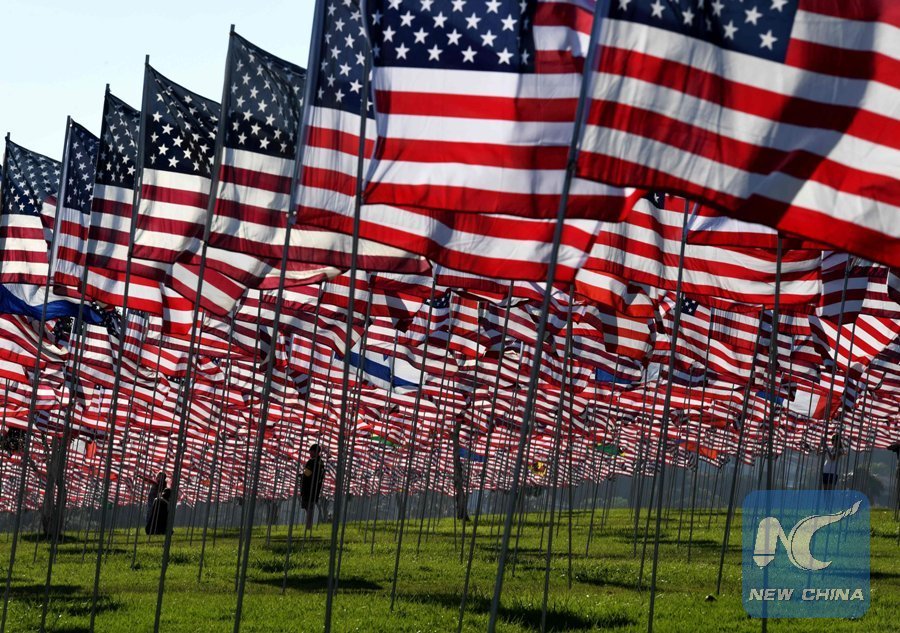
The students placed aound 3,000 flags in the ground in tribute to the nearly 3,000 victims lost in the attacks almost 15 years ago. (AFP PHOTO)
WASHINGTON, Sept. 11 (Xinhua) -- Fifteen years into its "war on terror" launched after the deadly 9/11 terrorist attacks, the U.S. government on Sunday touted its progress on securing the U.S. homeland against terrorist-directed attacks while acknowledging that the threat posed by violent extremists was far from receding.
"We've dealt devastating blows to al-Qaeda. We've delivered justice to Osama bin Laden. We've strengthened our homeland security. We've prevented attacks. We've saved lives," said U.S. President Barack Obama at a ceremony here honoring those who died in the 2001 attacks.
However, Obama noted that the threat the international community was facing today "has evolved."
"(Now) terrorists often attempt attacks on a smaller, but still deadly, scale. Hateful ideologies urge people in their own country to commit unspeakable violence," said Obama.
During his interview with CNN, U.S. Secretary of Homeland Security Jeh Johnson echoed Obama's warning and said that terrorist-inspired attacks, or lone-wolf attacks, was posing an increasingly serious threat to U.S. homeland security.
"We're safer when it comes to the 9/11-style attack," said Johnson. "But we've got this new environment and new threat which makes it harder."
In an intelligence brief released on Friday, The Soufan Group, a New York-based security consultancy pointed out that "only one of the goals stated in the aftermath of the (9/11) attacks has been realized: the U.S. has prevented another 9/11 scale attack."
"The other goals- denying terrorists sanctuaries, destroying al-Qaeda, countering violent extremism- have not been reached; all are worse now than before 9/11," said The Soufan Group.
There was indeed progress during the 15-year U.S. military campaign, climaxing with the death of bin Laden before the tenth anniversary of 9/11. At that time, Americans were thrilled with a feeling that the terrorists were finally on the run.
The hope for now has been dashed.
From West and North Africa to South Asia, extremist groups have been lining up to declare allegiance to either al-Qaeda or the Islamic State (IS), once an al-Qaeda franchised group founded after the U.S. invasion of Iraq in 2003.
Moreover, hailing from at least 86 countries as of December, 2015, between 27,000 and 31,000 people had travelled to Syria and Iraq to join the IS and other violent extremist groups, according to data provided by The Soufan Group.
In its initial report entitled Foreign Fighter in Syria, which was released in June 2014, The Soufan Group identified about 12,000 foreign fighters from 81 countries.
Meanwhile, according to Richard Haass, president of the Council on Foreign Relations, over the last decade, there have been on average more than 10,000 terrorist attacks per year, causing an average of over 15,000 deaths per year.
The resurgence of terrorism should by no means puzzling to any. While the goal of the war launched by the United States was supposedly to eliminate terrorism, the fear and hatred those foreign "meddlers" had stirred up in the Middle East has created a breeding ground for extremist ideology.
As the latest villain on its black list, the IS originated not in Iran or the Democratic People's Republic of Korea, the so-called "axis of evil" branded by Washington, but in Iraq, a state "freed" and "democratized" by the United States itself.
It is also thought-provoking that the IS militants drew much of their fighting experience from the West-involved war in Syria, where the Western bloc supported rebels in their efforts to topple Syrian President Bashar al-Assad.
Despite the far-reaching and devastating fallout of the Iraqi War, the U.S. authority did not necessarily learn from the lesson that military intervention could worsen the security situation.
Nothing could serve as a better example than the free fall of Libya into chaos after the multinational military intervention under the auspices of then U.S. Secretary of State Hillary Clinton, now the Democratic presidential nominee.
Calling Clinton the "chief architect" of the botched U.S. Libya policy, Republican lawmaker Peter Roskam revealed last October at a high-profile hearing on the 2012 Benghazi attack that Clinton insisted on the U.S. involvement in Libya despite grim warning and opposition from senior U.S. diplomats.
"(Stephen Mull, then executive secretary of the State Department) said this, 'In the case of our diplomatic history, when we've provided material or tactical military support to people seeking to drive their leaders from power, no matter how just their cause, it's tended to produce net negatives for our interests over the long term in those countries,'" quoted Roskam from communications from Clinton's private server.
"They (U.S. senior diplomats) were pushing back, but you overcame those objections," said Roskam, adding that Vice President Joe Biden, then Defense chief Robert Gates as well as the National Security Council also opposed military actions in Libya.
Unfortunately, Washington paid little attention to exploring the root causes of terrorism, and it would be a never ending war on terror if Washington fails to eliminate the root causes of its headache.

